Ask an Expert
Planning the right solution requires an understanding of your project's security goals. Let Kingston's experts guide you.
Your web browser is out of date. Update your browser now for better experience on this site. https://browser-update.org/update-browser.html

Healthcare organizations will always need to store and transfer personal health data, often referred to as Protected Health Information (PHI). Prioritizing data security will continue to be crucial to protect against cyberattacks and data loss to keep PHI safe. In fact, a survey by the American Medical Association found that 92% of patients believe that the privacy of their health data is a right and that it should be protected. This is easier said than done with data that has to be portable and shareable at a moment's notice.
While protecting PHI might appear trivial, a breach can have real consequences. For example, Scripps Health reached a settlement of $3.5 million after a 2021 ransomware attack.
Without scaremongering – let’s be clear and acknowledge that the volume of breaches involving healthcare entities is growing. Bad actors understand the value in compromising healthcare data, and ransomware attacks are growing fast, making healthcare worldwide a strategic target.
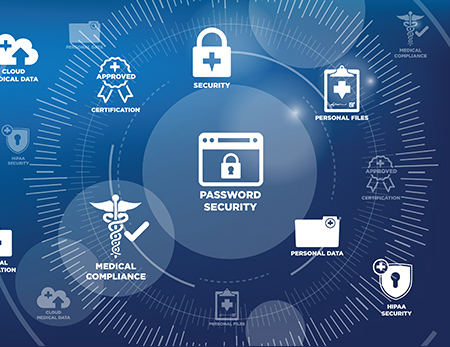
Let’s address these unique challenges and the need to comply with ever-changing regulations by simplifying things, with the simple requirement that data encryption needs to be a key part of any healthcare organization's security strategy.
After all, what can be seen can either be attacked, or secured! This is important to know when considering your data security plan.
At Kingston, we know that the proper protection of health data is serious business. There are several things to keep in mind when implementing encryption security for health data. First, it's important to understand the value of data encryption for regulatory compliance. HIPAA and other international regulations like GDPR and CCPA have requirements for personal data encryption. By using encryption, healthcare organizations can protect themselves from the consequences of a data breach and maintain compliance with these regulations.
But even encryption is tricky, as there are usually two types: Hardware- and software- based encryption.
Understanding the difference between software and hardware encryption holds implications for the security of patients' health data. Software encryption is often cheaper to implement upfront, but its security is reliant on the host system. As a result, it is vastly more vulnerable to hacking when passwords or recovery keys can be found in the host system memory, paging and hibernation files. In addition, many encrypted file formats can be attacked using software tools found on the internet for free or minimal cost, which can execute Brute Force password attacks to break the authentication process. Today’s computers can attempt 1 or more billion password guesses a second. Software encrypted files can also be copied and attacked in parallel by a network of computers, further cutting down the time to conduct Brute Force password attacks.
Hardware encryption is a dedicated security ecosystem completely contained within the storage device, whether a USB drive or an external SSD. Hardware-based encryption is always on, always protecting data, whereas anyone can remove software encryption on a drive by just reformatting it. For healthcare providers, this means that a rogue employee can disable the protection and turn a software encrypted drive into a breachable storage device.
As a result, hardware encryption in general is exponentially more secure as it does not expose passwords and encryption keys to the host system. However, that added security comes at a cost premium compared to unencrypted storage drives. Given that the average breach costs over $4.35{{Footnote.A68763}} million in the United States in 2022, software encryption savings can be illusory when there is a better option for mobile data – hardware-encrypted USB and external SSD drives with XTS-AES 256-bit encryption which incorporate Brute Force and BadUSB attack protections. If a hardware-encrypted drive is lost, it can reasonably be assumed to remain secure and keep protecting the PHI data with its strong security.
The Kingston IronKey XTS-AES 256-bit hardware-encrypted drive line-up includes user-friendly drives that address user frustrations with security. Multi-password support is available to allow users or providers to recover access to drives should a password be forgotten. There is now an alternative to complex passwords that no one can remember – a passphrase password up to 64 characters that can be the title of a favorite book or a song, a list of words, a line from poetry or song, or other phrases that are easy for doctors and other healthcare practitioners to remember – yet nearly impossible for an attacker to guess within the limited Brute Force password attack lockdown and crypto-erase retries.
Passphrases are available on Vault Privacy 50, 50C, and Vault Privacy 80 External SSD drives. Keypad drives like the Vault Privacy 80ES and Keypad 200 are PIN based, and are similar to using a cell phone for use cases where people prefer a PIN. The VP80ES drive also supports passphrases using a user-friendly alphanumeric keyboard on a touch screen.
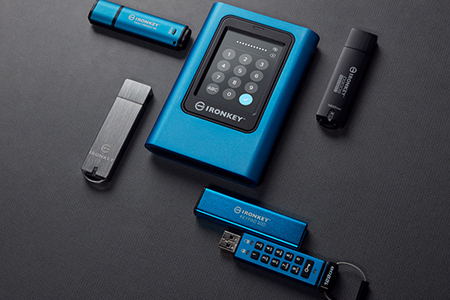
All IronKey drives feature strong Brute Force password attack protection on the drives. When an attacker guesses passwords, the drive counts the invalid attempts and locks the User passwords; when the Admin password attempts are exhausted, the drive automatically crypto-erases, and all data is lost forever. Software encryption does not possess the ability to strongly protect against such attacks.
OS-independent drives like the Vault Privacy 80ES and the Keypad 200 are ideal for protecting data transferred between medical machines and computers, which are commonly required for many devices used in healthcare services. For example, many lab machines require manual transfer of data by technicians into the provider’s computer system.

In addition to hardware-encrypted devices, healthcare organizations should consider additional cybersecurity data hygiene measures like training employees on best practices, implementing multi-factor authentication, and regularly updating software and systems. Even for small healthcare providers, regular backups on hardware-encrypted external SSDs can be the difference between being a victim of ransomware attacks and being able to recover systems quickly.
By taking a layered approach to security and ingraining data protection in the daily habits of employees, healthcare organizations can effectively protect patient data. Integrating Kingston IronKey hardware-encrypted drives as part of the data security strategy is an effective way to ensure compliance with HIPAA and other health data protection regulations.
You can find more Kingston IronKey products to meet healthcare data security needs or Ask an Expert on Kingston IronKey who can help you keep your patients’ data safe.
#KingstonIsWithYou #KingstonIronKey
Was this helpful?

Planning the right solution requires an understanding of your project's security goals. Let Kingston's experts guide you.
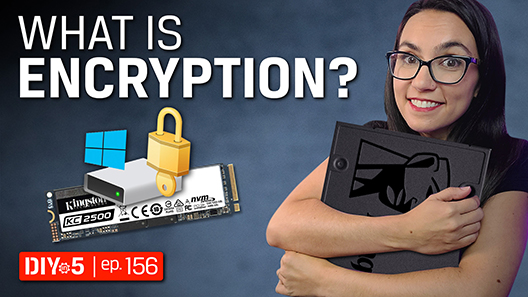
There are two main types of encryption - software encryption and hardware encryption.
No products match your current filter selection. Try adjusting your filters to explore more options.

Looking for improved data security & need to know what is encryption? Kingston covers the basics.
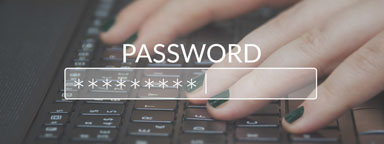
Hardware, not software-based password protection, is the best way to protect files and drives.

Secure important personal and private information on a PC with a hardware encrypted SSD.

Breaches remain a major threat. Explore the need of comprehensive cybersecurity measures.

Here is a list of USB security features to consider for data protection.

Learn what the 3-2-1 data backup method is and why it is your best defense against ransomware.
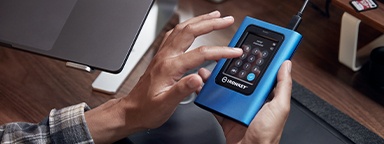
Learn data security best practices with Dr. Vynckier, and the importance of offline backups.

David Clarke covers encryption, superuser safeguards, vulnerability management, and training.

Learn how Kingston IronKey's solutions helped EgoMind enhance their data security hygiene.

The differences between SSD classes lies in two components; the processor and the NAND memory.

We discuss NIS2 and DORA, and how organizations can turn compliance into an opportunity.

We discuss the shifts in how organizations are storing and encrypting sensitive data.

Kingston examines how to secure sensitive files with the increasing vulnerability of email.

Learn how Kingston IronKey hardware-encrypted solutions supports NIS2 Directive compliance.

Kingston IronKey has hardware options to protect small and medium businesses against cybercrime.

FIPS 140-3 Level 3 is certified by the world-leading agency NIST as the apex of encryption.

Questions to ask when seeking the right SSD for your organization’s data center.

Our infographic showcases the differences between software and hardware-based encryption.

2023 has been a year full of challenges and innovations. But what will 2024 bring?

Learn about two methods that give SMBs superior resilience vs. ransomware: encryption & backups.

In this whitepaper, we explain how to enforce a DLP strategy, while allowing USB drive use.

Enterprise-grade and military-grade digital security: two high standards with different requirements.
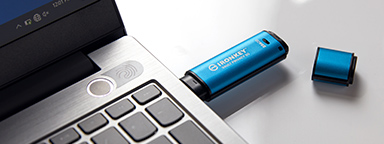
Learn how hardware encryption can protect a travelling lawyer’s confidentiality with secure file storage.

How is pen testing ensuring Kingston IronKey USB drives lead the way in trusted data security?

Hardware-encrypted Kingston IronKey drives protects organizations’ data on the move.

Bring Your Own Device (BYOD) policy is tricky for employers. How to balance security & convenience?

How do encrypted drives improve cybersecurity and compliance for finance companies? Kingston explains.

DLP offers tools for network admins to protect sensitive data from cybercrime and negligence.

How can we bolster network security with remote working and international travel so common now?

Invest in encrypted drives so that if they are lost or stolen you are not on the hook for legal fees which can be more expensive.

Discover why national security agencies trust Kingston IronKey to protect their data.

A company’s IT specialists should be expected to add data security to the PCs of remote workers.

Kingston’s three key practices for a robust DLP for businesses handling sensitive data.

You can read and write to an encrypted USB flash drive with an iPad or iPhone with the right adaptor. Here’s how.

Learn why hardware encryption beats software encryption for law firm data protection.

Passphrases are superior to complex passwords for keeping data secure, with many powerful benefits.

A brief explaining the purpose and types of data security software available.

HIPAA requires healthcare organizations to always keep patient data safe, including in transit.
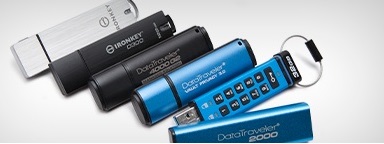
This requires encryption of sensitive data, appointing a Security Officer, cyber security programs and policy adoption.

Kingston IronKey encrypted USBs are a security consideration for organizations of all sizes.

We compare unencrypted and encrypted USB drives and explain how to keep data secure!

Learn how Kingston IronKey is protecting the intellectual property with customization.

Discover why Kingston IronKey is the go-to solution for protecting financial services data.

Learn how Kingston IronKey is securing the military operations’ data.
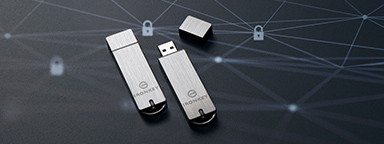
How can you get your organization to use encrypted drives and make them part of your security policy? Here are some tips.

Learn how Kingston IronKey is protecting the telecoms industry's data using encryption.

Encryption is an incredibly helpful option for creatives to protect their clients’ important files.

Kingston IronKey encrypted USBs: a small but important part of any organization’s security strategy.

Kingston IronKey can help mitigate data loss resulting from the rise in lost electronic devices.

In this eBook, we explore how encrypted USB drives have become a key tool in keeping data secure.
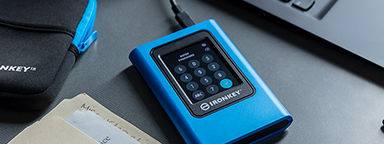
How to use your IronKey Vault Privacy 80 External SSD: set password, connecting to a PC and more.

Organizations are considering data security options to protect against private mobile data breaches.

Discover how Kingston IronKey is protecting the sensitive data of the finance sector.

Here is how Kingston IronKey helped protect the sensitive data of the Energy industry.

We explore our KingstonCognate experts’ thoughts on cyberthreats and cybersecurity challenges.

Software based encryption can be disabled by the user. This can lead to fines and legal fees if the drive is lost.

We explore Tomasz Surdyk's thoughts on how all entities can stay secure in the digitized world.

Don’t plug any USB drives into your computer if you don’t know exactly where they came from.

Protection data on the move with superior hardware-based Advanced Encryption Standard (AES) 256.

What we learned from Kingston’s experts and tech influencers on work-from-home enablement Twitter chat.

There are benefits to using both cloud storage and hardware-based encryption.

We explore the top 12 tips small and medium size enterprises can take to enhance cybersecurity.

We’ve examined several factors using unique research to identify what may impact markets globally in 2022.

2021 has been a year full of challenges and innovations. But what will 2022 bring?

Prof. Sally Eaves shares her thoughts on the SME cybersecurity landscape and the need for education & support.

Bill Mew shares his thoughts how the largest security challenges need commitment from the boardroom.

Rob May shares his thoughts on how close we are to edge computing and the security it requires.

Write your diary digitally with a password protected, cloud backup solution.

The pandemic has increased internet traffic which has placed importance on the role of data centers.

The use of DLP software, VPNs, encrypted SSDs, and USBs will help mitigate some risks of remote working.
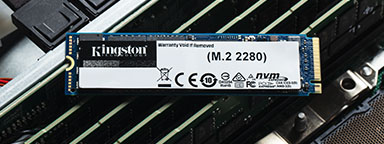
Cameron Crandall of Kingston helps you self-evaluate the need to move to your server storage solution to NVMe.

There are many advantages to using a dedicated hardware encryption processor in USB flash drives.

What will 2021 bring in tech and trends? What do our KingstonCognate members and industry experts predict for the future?

Cyber security and data privacy are everyone’s responsibility. What are the key considerations?

Learn why the future of business depends on SSD-enabled SDS, and how SSD fits into software-defined storage solutions.

Kingston & Matrix42 partnered to give optimal endpoint security solution in multiple sectors to mitigate risks.

Organizations must consider revenue, profit, and risk equally in order to mitigate data security & cyber security risks. In this article, industry expert Bill Mew provides an insight into this topic.
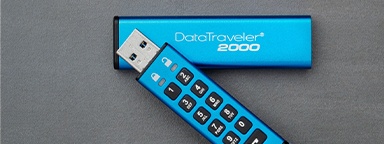
What do industry experts think has changed since the introduction of GDPR?
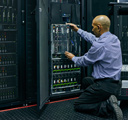
Data centers should be using server SSDs. There are many benefits over client drives and costs have come down.

NVMe is now the standard protocol for SSDs to empower data centers and enterprise environments.
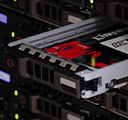
Find out how Hardwareluxx were able to manage the growth of their web traffic using Kingston's DC500M SSD.

SDS hasn’t lived up to its hype but now that NVMe is more affordable the commodity hardware is ready to deliver.

Choosing the right SSD for your server is important since server SSDs are optimized to perform at a predictable latency level while client (desktop/laptop) SSDs are not. These difference result in better uptime and less lag for critical apps and services.
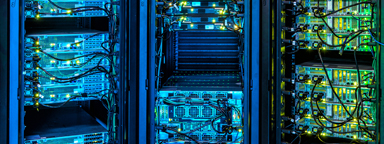
Cloud and on-premise data center managers can learn a lot from supercomputing.

To work from home you need a good workspace for your PC, the right conferencing gear, and a secure connection.
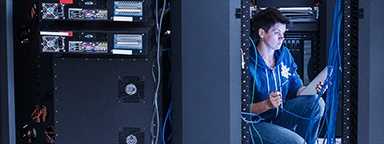
What strategies can organizations use to best secure customer data in a post-GDPR world with the ever-evolving nature of cyber security threats? Kingston pooled the knowledge of some of the UK’s most experienced commentators in cyber security to discuss how data protection has changed since the introduction of GDPR.
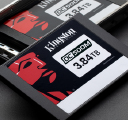
This whitepaper demonstrates how using Kingston Technology’s Data Centre DC500 SSDs can reduce your overall capital and licence costs by 39%.

Data Center 500 Series SSDs (DC500R / DC500M) – Consistency, predictability of Latency (response time) and IOPS (I/Os Per Second) performance.

You already know that remote working is a business enabler. But the challenges posed to your network security and compliance with GDPR are too big to ignore.

How to enable and disable Microsoft’s BitLocker eDrive feature to leverage hardware encryption on your Kingston SSD

The recent WannaCry ransomware made global headlines infecting and alerting everyone from government, healthcare, communication providers, automotive companies to corporations and the general public of their vulnerabilities.
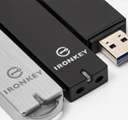
Overall, Kingston / IronKey Encrypted USB Drives prove to be the best solution in reliability, compatibility and security for portable data protection solutions.
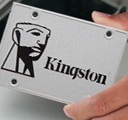
End-to-End Data Protection protects customer’s data as soon as it is transferred by the host system to the SSD, and then from the SSD to the host computer. All Kingston SSDs incorporate this protection.

Some of Kingston and IronKey's Secure USB Flash drives are powered by partners, licensed technology, or services.
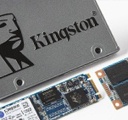
Firmware/hardware PFAIL protection is an highly effective method for preventing data loss in enterprise SSD.

HPC can require massive amounts of data. SSDs consume a fraction of the power of their spinning disk.
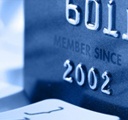
Kingston datacenter SSDs provide excellent resiliency to protect sensitive data in OLTP workloads.
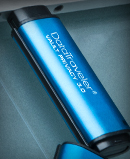
This program offers the options most frequently requested by customers, including serial numbering, dual password and custom logos. With a minimum order of 50 pieces, the program delivers precisely what your organization needs.
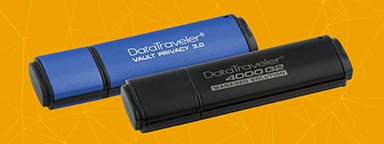
256-bit AES hardware-based XTS block cipher mode encryption is used in DT 4000G2 and DTVP 3.0.
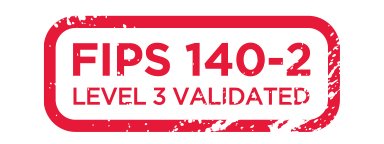
Most IronKey and Kingston secure USB flash drives are FIPS 140-2 Certified.
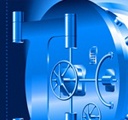
Case in point, Heathrow Airport in London (October 30, 2017) uses Unencrypted USB Drives for its non-cloud storage. Unfortunately, they were not standardized on Encrypted USB drives. Their lack of implementing proper standards in data security / data loss protection with encrypted USB storage has now cost the EU a major breach of confidential and restricted information.
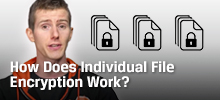
Linus breaks down hardware encryption making sure your files are safe and secure, especially when you're on the go. Make sure your portable storage is also safe and encrypted with Kingston Encrypted USB drives.

Storage can be the most challenging component for VDI performance.
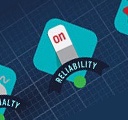
Testing is a cornerstone of our commitment to deliver the most reliable products on the market. We perform rigorous tests on all of our products during each stage of production. These tests ensure quality control throughout the entire manufacturing process.
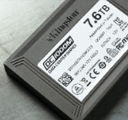
NVMe (Non-Volatile Memory Express) is a communications interface and driver that defines a command set and feature set for PCIe-based SSDs with the goals of increased and efficient performance and interoperability on a broad range of enterprise and client systems.



